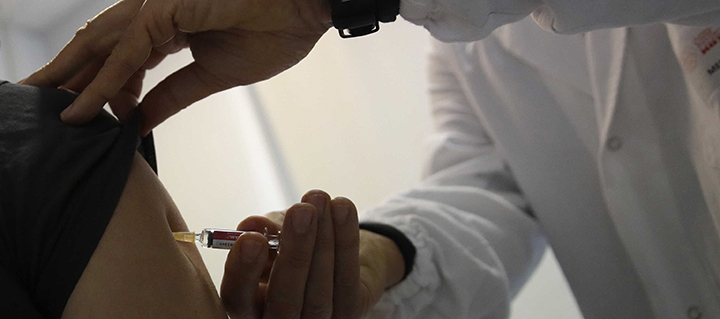Brandenburg has become the first state in Germany to require all children attending kindergarten to be vaccinated for measles and other infectious diseases as fears spread across Europe about the influence of the anti-vaccination movement and lower immunization rates.
A decrease in immunization has led to an increase in measles in Germany, France, Italy and elsewhere.
The German government is considering whether to mandate vaccinations across the country. Authorities there say 2019 is likely to be a record year for measles with cases tripling in three states. Other European countries have already introduced laws making vaccinations compulsory, including Italy which two years ago passed a law making 10 vaccines obligatory for children who enrolled in Italian schools, including chickenpox and measles.
Last week, New York City Mayor Bill de Blasio declared a public health emergency with 285 cases of measles confirmed since October. City health officials have ordered mandatory vaccinations for anybody who’s been in contact with infected people and violators can face fines of up to $1,000.
Health officials say a booklet produced by an anti-vaccine group has been widely disseminated through Orthodox Jewish communities, not the first time in the United States an insular community has seen a jump in infection rates as a result of a fall in immunization rates prompted by anti-vaccine campaigners.
Under the Brandenburg law children who have not been vaccinated against measles will be excluded from attending kindergartens. Brandenburg lawmakers say they will examine whether to add other vaccinations. “In the public interest, individual concerns towards vaccination, which cannot be proven scientifically, must take second place,” said Sylvia Lehmann of the Social Democratic Party.
State lawmakers from Germany's right-wing populist Alternative fuer Deutschland (AfD) voted against the legislation, noting a vaccine obligation last existed in east Germany when the communists were in power. The Green Party abstained from the vaccine vote.
Brandenburg’s health minister Andreas Buttner says “the protection of babies and pregnant women” should take “precedence over the rights of those who refuse to have their children vaccinated.” In Brandenburg 73.5% of young children are being vaccinated within the recommended time frame of 23 months.
In some Germany’s other states, including Lower Saxony and Schleswig-Holstein, school principals have been taking action by ordering children who have not been vaccinated to go home.
The World Health Organization said more Europeans contracted measles last year – 82,600 – than at any time in the past decade.
German Health Minister Hermann Groehe is proposing a federal law obligating nursery schools in all of the country’s 16 states to report parents to health officials if they cannot prove that they sought vaccination advice for their children. If the law is passed, parents who do not show proof of such medical consultation could be fined up to $2,800.
“No one can be blasé about the fact that people are still dying of measles,” Groehe told Germany’s Bild newspaper. “Therefore we are now toughening the regulations for vaccination protection.”
But Groehe has so far ruled out making vaccinations compulsory for school children, as Italy recently did.
Italy’s approach has been characterized by U-turns, thanks to the vaccine-sceptic anti-establishment Five Star Movement (M5S), which is in a coalition government with the populist Lega party.
M5S had helped to fuel the anti-vaccination campaign and poured scorn on expert opinion that insists vaccines are safe and the combined measles, mumps and rubella (MMR) vaccine isn’t linked to autism. The party argued requiring schoolchildren to be vaccinated was “coercive.”
Last year, the health minister, a member of the Five Star Movement, introduced a temporary measure to allow children to stay in school as long as their parents declared they had been vaccinated without having to provide any documentation. Italian measles rates then skyrocketed and last year the country accounted for nearly a quarter of all new cases in Europe, according to WHO.
The organization says 95% of a population needs to be inoculated for the spread of the disease to become unlikely, protecting those who cannot be vaccinated for serious health reasons, including lowered immunity.
In March, the Italian government allowed the M5S's temporary measure relaxing vaccination rules to expire, bringing back into play a two-year-old law requiring children to receive mandatory immunizations before attending school.
Analysts say there has been a noticeable shift in public opinion favoring vaccinations since an Italian populist politician who has campaigned against compulsory vaccinations was hospitalized last month after contracting chickenpox and was widely mocked on social media.
Send your news stories to This email address is being protected from spambots. You need JavaScript enabled to view it. and via WhatsApp on 004917632140550
Sidebar
Magazine menu

 Teline V
Best News Template For Joomla
Teline V
Best News Template For Joomla
23
Tue, Apr
0
New Articles










